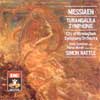Messiaen Turangalila Symphony, etc
View record and artist detailsRecord and Artist Details
Composer or Director: Olivier Messiaen
Label: EMI
Magazine Review Date: 12/1987
Media Format: CD or Download
Media Runtime: 130
Mastering:
DDD
ADD
Catalogue Number: 747463-8

Tracks:
| Composition | Artist Credit |
|---|---|
| Turangalîla Symphony |
Olivier Messiaen, Composer
City of Birmingham Symphony Orchestra Olivier Messiaen, Composer Peter Donohoe, Piano Simon Rattle, Conductor Tristan Murail, Ondes martenot |
| Quatuor pour la fin du temps, 'Quartet for the End of Time' |
Olivier Messiaen, Composer
Aloys Kontarsky, Piano Hans Deinzer, Clarinet Olivier Messiaen, Composer Saschko Gawriloff, Violin Siegfried Palm, Cello |
Composer or Director: Olivier Messiaen
Label: EMI
Magazine Review Date: 12/1987
Media Format: Vinyl
Media Runtime: 0
Mastering:
DDD
ADD
Catalogue Number: EX270468-3

Tracks:
| Composition | Artist Credit |
|---|---|
| Turangalîla Symphony |
Olivier Messiaen, Composer
City of Birmingham Symphony Orchestra Olivier Messiaen, Composer Peter Donohoe, Piano Simon Rattle, Conductor Tristan Murail, Ondes martenot |
| Quatuor pour la fin du temps, 'Quartet for the End of Time' |
Olivier Messiaen, Composer
Aloys Kontarsky, Piano Hans Deinzer, Clarinet Olivier Messiaen, Composer Saschko Gawriloff, Violin Siegfried Palm, Cello |
Author: Michael Oliver
The second point of contrast is in the central slow movement of the work, ''Jardin du sommeil d'amour'', and here I cannot make up my mind which I prefer. Salonen sees the garden in which love lies sleeping as brightly sunlit and thronged with melodious but certainly not muted birds. Rattle adopts a slower pace (and slows down still further towards the end) and a gentler, softer, almost veiled sound; a garden from which the sun has not yet lifted the morning haze, perhaps (and the ondes, again, do not penetrate the mist too far). Both performances are very beautiful; I suspect that both approaches may be equally valid.
A more tentative matter, but one which I find crucial, is the route taken by the final three movements. Salonen's reading seems to me to imply quite strongly that movement No. 8 (''Developpement de l'amour'') is a crisis point ending with an almost terrifying descent into blackness, from which the austerely solemn rituals of ''Turangalila III'' rescue the music, salvation being ecstatically celebrated in the finale. Rattle finds rather less darkness and fewer disruptive conjunctions of tempo in ''Developpement de l'amour'' and there is more of Ravelian chinoiserie than solemnity to his ''Turangalila III'', partly because his muted solo strings and the rhythmic percussion that they shadow are both dominated by the piano and the gamelan group. To my ears the finale therefore sounds less culminatory (Salonen implicitly confirms his view that ''Turangalila III'', is an upbeat to it by allowing only the barest pause between them; the gap in Rattle's reading is achingly wide). But Rattle's is a reading of great distinction, it is brilliantly played, and its dynamics are sometimes more carefully judged than Salonen's (Rattle's ''Joie du sang des etoles'' is a notch less excitingly headlong than his, but less unremittingly loud). If you do not share my feelings about the ondes martenot and the dramatic sequence of the concluding movements, you may even prefer Rattle's account; honours are pretty equally divided between them otherwise, between the two admirable pianist and between the recordings (a touch more depth, perspective and detail to Salonen's CBS, perhaps, but I have been listening to his account on CD; I look forward to the CD version of the Rattle/EMI very much indeed).
Salonen's reading is coupled with first-rate performances of Lutoslawski's Third Symphony and his Les espaces du sommeil. The account of the Quatuor pour la fin du temps chosen as fill-up for Rattle's Turangalila is not the best ever recorded (it has an astonishingly slow performance of the movement with cello solo which seems to go on for hours) but it is a fairly respectable one, with a very resourceful clarinettist and a nicely tender account of the finale from Gawriloff. I slightly prefer it to the DG performance with Barenboim (both his string players are altogether too fond of a wide vibrato) but would not choose either if the Quatuor were my main concern.'
Discover the world's largest classical music catalogue with Presto Music.

Gramophone Digital Club
- Digital Edition
- Digital Archive
- Reviews Database
- Full website access
From £8.75 / month
Subscribe
Gramophone Full Club
- Print Edition
- Digital Edition
- Digital Archive
- Reviews Database
- Full website access
From £11.00 / month
Subscribe
If you are a library, university or other organisation that would be interested in an institutional subscription to Gramophone please click here for further information.





